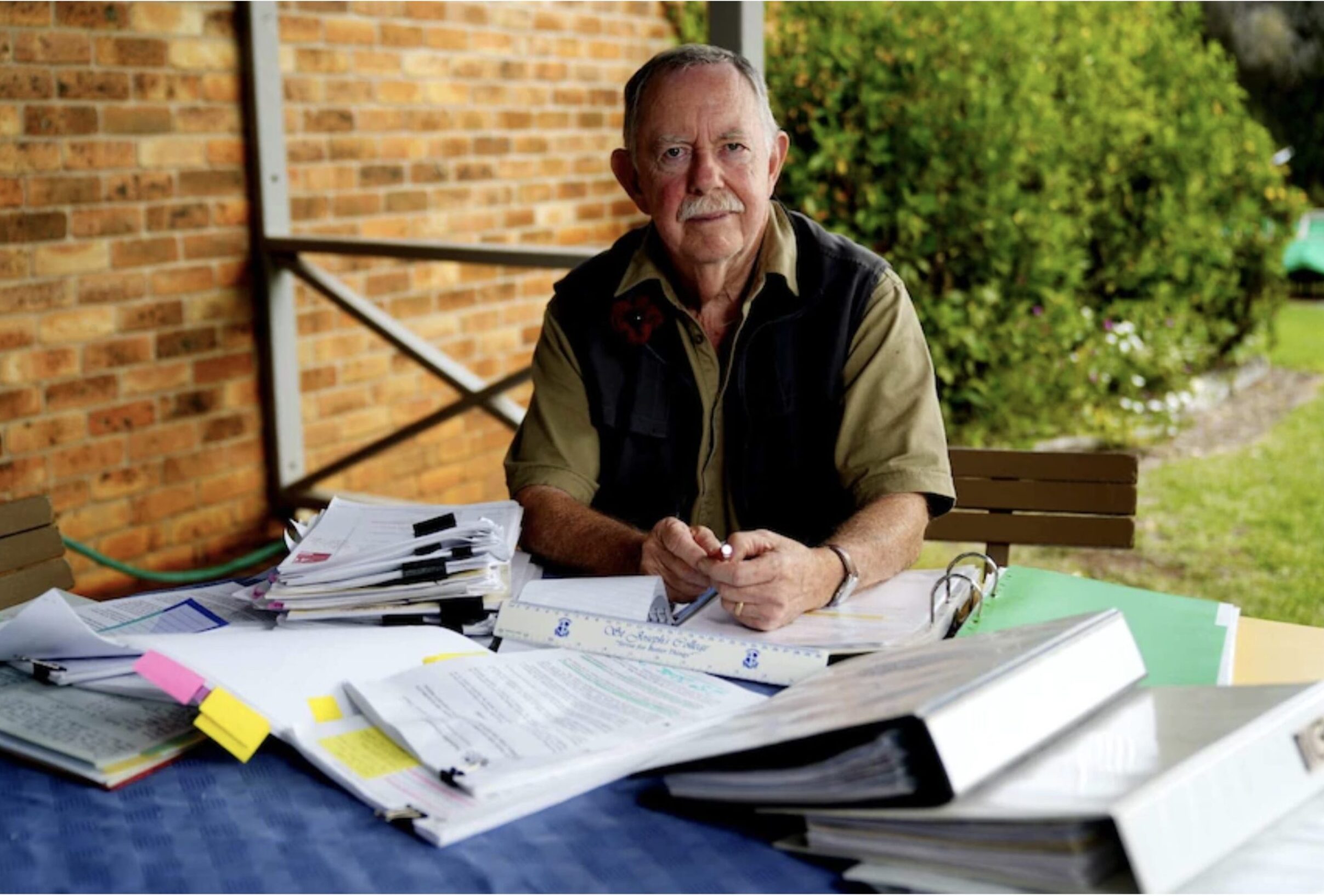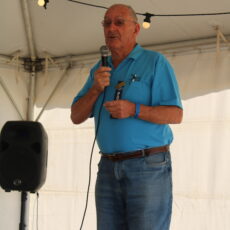Richard Barry OAM, of Narrabri, a National Service veteran of the Vietnam War, has for many years campaigned for medal recognition for a cohort of Australia’s National Service soldiers who served in the war. He tabled the following at a Narrabri RSL Sub-branch meeting in April and was unanimously supported by members:
This is a complicated issue with a chequered history. I’ll abbreviate it to the best of my ability. In 1996 a group of my mates were discussing the Republic of Vietnam Campaign Medal (RVCM). They said blokes not entitled were wearing it whereas others who endured heavy battlefield combat for several months were not entitled. In fact there were some 2600 navy personnel who were awarded this medal in 1967 even though they never stepped foot on Vietnamese soil and were not part of the gun line. Both the Chief of Defence Force and the Chief of Naval Staff admitted the error and no attempt was made to have the medals surrendered based on their incorrect interpretation. Both made no attempt or expressed any desire to recover the medals. Therefore the Australian government has got away with a different interpretation. So, we have veterans not entitled to this medal marching alongside those who should have the medal. This has caused angst within the veteran community. Then via the Freedom of Information Act I found members of philanthropic organisations (Young Men’s Christian Association, Campaigners for Christ etc) were issued this Campaign medal by the Australian government with yet another interpretation. This was in clear breach of the 1965/66 Vietnamese Directives whereby this medal should be only issued to those who fought with local forces against a common enemy. These people were non combatants who did not ‘provide direct combat support’.
The Christian folk did a great job but they never engaged in armed combat against the Viet Cong or North Vietnamese regular forces. Allied countries like New Zealand and the United States categorically stated their similar organisations were not eligible for the RVCM. These cases demonstrate that the Australian government applied different interpretations of the eligibility criteria when approving the awarding of the RVCM for its own personnel.
The RVCM is awarded for 181 days in South Vietnam or if WIA and medically evacuated if a lesser time. This got me thinking so I contacted the Statistical section of DVA and was issued the spreadsheet of those NS who had served in SVN less than 181 days – names, service numbers, units and days served. There are some 2500 of them nation-wide. Yes, there are regular or career soldiers who served less than 181 days. They were volunteers and could extend their service without any difficulty. Whereas the conscript was compulsorily called away from his five-year civilian career under the threat of two-years jail and a criminal record for failing to register. These men were under no obligation to extend their service essentially because (1) their employer held their job open for the time away – not one day longer under the NS Act of 1964 (as amended) and (2) they’d miss out on lucrative benefits available to national servicemen.
Therefore the entry and exit provisions differed between the two. Maybe a precedent will be established if I am successful because in Vietnam there was really no difference between the two except for their service numbers.
I found out that the majority of these national servicemen went to South Vietnam having less than 181 days remaining of their lawful service. They were doomed right from the start as it was plainly obvious and foreseeable. I found out many were sent home suffering from tropical and life-threatening diseases or from terrible accidents. Astonishingly these men are not eligible for the RVCM. So, we have a cohort, through no fault of their own, have been overlooked and forgotten by their government. Such negligence has been aggravated by an incomprehensible degree of obstinacy on the part of decision-makers, as enabled by government lawyers including lawyers from the office of the Australian
government Solicitor.
The matter went before the Defence Honours & Awards Appeals Tribunal (DHAAT) in 2014/15. It has consistently maintained it is incapable of altering the eligibility criteria for the award of the medal. We have consistently accepted that argument – albeit contentious and capable of argument to the contrary – but, rather, have sought a more empathetic and equitable or flexible approach; to addressing this highly inequitable situation. That decision was readily accepted. What we wanted was for the Tribunal to rule on the basis of equity, fairness and justice for these men – nothing whatsoever to do with trying to alter or amend criteria.
These men, for many years, encountered remarkably entrenched opposition to their case which has consistently applied blind adherence to policy in the absence of any demonstrated consideration of the individual merits of the case. This is, of course, inconsistent with a fundamental tenet of administrative law. Such merit-based consideration should properly have included an analysis of the equitable basis of the claim as well as a detailed analysis of legal positions beyond the ‘black-letter’ policy being repeatedly espoused.
So, why am I involved. Well, there are 2500 reasons and two of them are local – maybe more. I watched as I saw two of my mates being lowered in the ground recently. L/Cpl George Sanderson (3RAR) from this sub-Branch and L/Cpl Brian Warren (6RAR) at Wee Waa. Both were riflemen in an infantry battalion. Both were involved in heavy contact with the enemy.
Both were sent home having completed their valiant and lawful service. In fact Brian was a Forward Scout like myself. Both not ‘thanked’ by the former Vietnamese government with the RVCM. I recall George coming up to me at one meeting visibly upset that a veteran had called him out over the RVCM. Completely unnecessary. I served with Brian in the 6th Battalion Royal Australian Regiment. I found evidence whereby DHAAT had issued foreign (Vietnamese) awards long after the Vietnamese government ceased to exist in 1975. So, there is no need to be worried about that aspect.
Then I stared to receive numerous testimonials from affected veterans, from their wives and children. Many not marching on Anzac Day because they were sick and tired of being called ‘short-timers’ and ‘second-class veterans’. These letters were horrendous and distressful. In fact I referred several to the Royal Commission into Veteran and Defence Suicide. I managed to speak with Commissioner Nick Kaldas APM two weeks ago and he was very receptive. This shouldn’t be happening in 2024! Most are nearing 80, many are ill and confined to homes whilst a lot are suffering from chronic war-caused PTSD.
I then started to write letters. Many letters. Eventually I had twelve A4 typed pages of supporters including from this sub-Branch and I thank Past President Gary Mason OAM for that. The list contains politicians from all sides, several ex-Prime Ministers and Deputy Prime Ministers, very senior officers Vietnam veterans (all regulars I might add some with two tours), high profile community leaders, retired Government-General, several ex-servicemen’s associations including the VV Federation of Australia, National Servicemen’s Association of Australia, several branches of the RSL, Vietnamese Community of Australia, members of the Army of the Republic of Vietnam (ARVN) and Rangers Vietnamese veterans and so on.
It was very pleasing to have so many veterans who have the RVCM to fully support the campaign.
The campaign was on the cusp of approval by the former government when the federal election intervened in May 2022. We had to start all over again with a new government. The Minister sat on my submission for over 18 months and then decided not to make a decision because he believed it was unlawful for him to do so. We have decided not to give up. In the past we have adopted a ‘softly-softly’ approach and flown under the radar. Not anymore. The matter has been aired on 2GB Ben Fordham and an ABC journalist will be writing an article prior to Anzac Day. There is an ongoing petition whereby 22,000 people have signed to get this done.
There is much more to this story and so I am respectfully asking for your support to have my motion accepted to allow it to go forward to District, State, National and eventually to the National Advisory Committee.
These men have offered to pay for this medal like the Korea veterans had to do a few years back. If this campaign is approved there will not be any avenues for perceived compensation.
There will be no perceived diplomatic sensitivities – as per the recent example when the Vietnamese Citation was approved for all Vietnam veterans. So we are asking the Minister to have another look on the basis of equity, fairness and justice. I don’t have a vested interest in this matter because I was officially awarded this medal.
Whilst the Government of the Republic of South Vietnam no longer exists, that fact is entirely irrelevant since the intent at the time of the decision to award the RVCM to Australian forces was that any determination as to eligibility is to be made by Australian authorities. Clearly any argument that any further determinations as to eligibility must be at the behest of the Government of South Vietnam must fail.
Regardless of the circumstances bringing about the individual service member’s ’end-of-war’, be it the cessation of hostilities or the end of a period of lawful compulsory service, the demands of equity and precedent (U.S. Government in its ‘end-of-war’ arrangement reduced the requisite service from 181 days to a minimum of 60 days service – specifically done only to ‘enhance the morale of its troops’ because they were going to miss out on the RVCM) support our proposition as to eligibility.
The case advanced by me on behalf of some 2500 subject of this inequity is compelling at law and in equity and certainly warrants attention in detail beyond the limited and often entirely lacking attention given to the points to date.
To order photos from this page click here









Richard
My late good friend, Lance – Bombardier Colin James Howard Service number 5715272 served between 17/12/1968 and 18/06/1969, a total of 184 days.
He was in the National Service with the Royal Regiment of Australian Artillery.
His Vietnam War Service record says: Honours – None to Display.
What is Col’s eligibility for any medals and in particular, the Republic of Vietnam Campaign Medal?
Col has a daughter in Perth and doesn’t know I am doing this research but, eventually, I will.
I heard Senator Paul Scarr on 2GB recently and this triggered my interest in this unfair treatment of Vietnam Veterans.
For the record, my father served in New Guinea on the Kakoda trail and will remember him tomorrow at dawn in Perth.
Best wishes.
Contact me – richyvon47@hotmail
Hi Richard, I recently saw your letter in the TPI Association newsletter. I served 156 days in ’71 and have been treated for NHL on and off for last 20 years. I have been TPI’d for that time. If you could email me it would be much appreciated. Cheers, Ron Baikie
Anzac Hero
When I came back from Vietnam,
with only one leg on which to stand,
I got a service medal and a frame to hang it in.
Thought I was an ANZAC hero!
But, back home no one seemed to care
about the things we had to do out there.
One spat at me in my wheel-chair.
Didn’t feel like an ANZAC hero.
But I saw mates die out on patrol,
Never knew who was in control.
and fired my gun when I was told
When I became an ANZAC hero.
We were there to find and kill V.C.
‘cause we were spreading democracy.
We were just trying to set them free!
Not become ANZAC heroes.
So we burned a village to the ground.
The screaming made such an awful sound.
With my M16 I cut her down.
Then I cried like an ANZAC hero.
And I couldn’t get to sleep at night
‘cause I’d see flames dance in my gun sight.
Doctor said I’d be alright.
Try and act like an ANZAC hero.
Well I survived in that Asian hell.
And I did a few things I’m ashamed to tell.
But now I get to join the R.S.L.
And I drink like an ANZAC hero.
And I get to march in their ANZAC parade,
But I can’t make it all that way,
So I get pushed by my comrades,
And I wave like an ANZAC hero
But I got involved in defoliation,
‘cause the Yanks they sprayed the whole damn nation.
And I can’t get any compensation,
I just itch like an ANZAC hero.
I guess it runs in the family,
My grandad fought at Gallipoli.
His blood, it stained the rosemary,
When he became an ANZAC hero.
In 87 you welcomed us home,
Now I don’t feel so quite alone!
But why did you have to wait so bloody long
To call me an ANZAC heroes?
I haven’t had all that much to say,
Since the chopper came to take me away,
But I lost more than my leg that day,
I became an ANZAC hero.
So mourn your dead lucky country.
I bet you don’t remember me.
You sent me off to war when I was nineteen,
And its never made any sense to me.
W. Arnold 1987
Anzac Hero
When I came back from Vietnam,
with only one leg on which to stand,
I got a service medal and a frame to hang it in.
Thought I was an ANZAC hero!
But, back home no one seemed to care
about the things we had to do out there.
One spat at me in my wheel-chair.
Didn’t feel like an ANZAC hero.
But I saw mates die out on patrol,
Never knew who was in control.
and fired my gun when I was told
When I became an ANZAC hero.
We were there to find and kill V.C.
‘cause we were spreading democracy.
We were just trying to set them free!
Not become ANZAC heroes.
So we burned a village to the ground.
The screaming made such an awful sound.
With my M16 I cut her down.
Then I cried like an ANZAC hero.
And I couldn’t get to sleep at night
‘cause I’d see flames dance in my gun sight.
Doctor said I’d be alright.
Try and act like an ANZAC hero.
Well I survived in that Asian hell.
And I did a few things I’m ashamed to tell.
But now I get to join the R.S.L.
And I drink like an ANZAC hero.
And I get to march in their ANZAC parade,
But I can’t make it all that way,
So I get pushed by my comrades,
And I wave like an ANZAC hero
But I got involved in defoliation,
‘cause the Yanks they sprayed the whole damn nation.
And I can’t get any compensation,
I just itch like an ANZAC hero.
I guess it runs in the family,
My grandad fought at Gallipoli.
His blood, it stained the rosemary,
When he became an ANZAC hero.
In 87 you welcomed us home,
Now I don’t feel so quite alone!
But why did you have to wait so bloody long
To call me an ANZAC heroes?
I haven’t had all that much to say,
Since the chopper came to take me away,
But I lost more than my leg that day,
I became an ANZAC hero.
So mourn your dead lucky country.
I bet you don’t remember me.
You sent me off to war when I was nineteen,
And its never made any sense to me.
W. Arnold 1987
any help regarding vietnam medal would be very much appreciated along with a number 12 intake people who served in vietnam with 8RAR and sent home early for dicharge thank you for ongoing effort on our behalf. yours truly Henry HOUTSMA army number 3793919